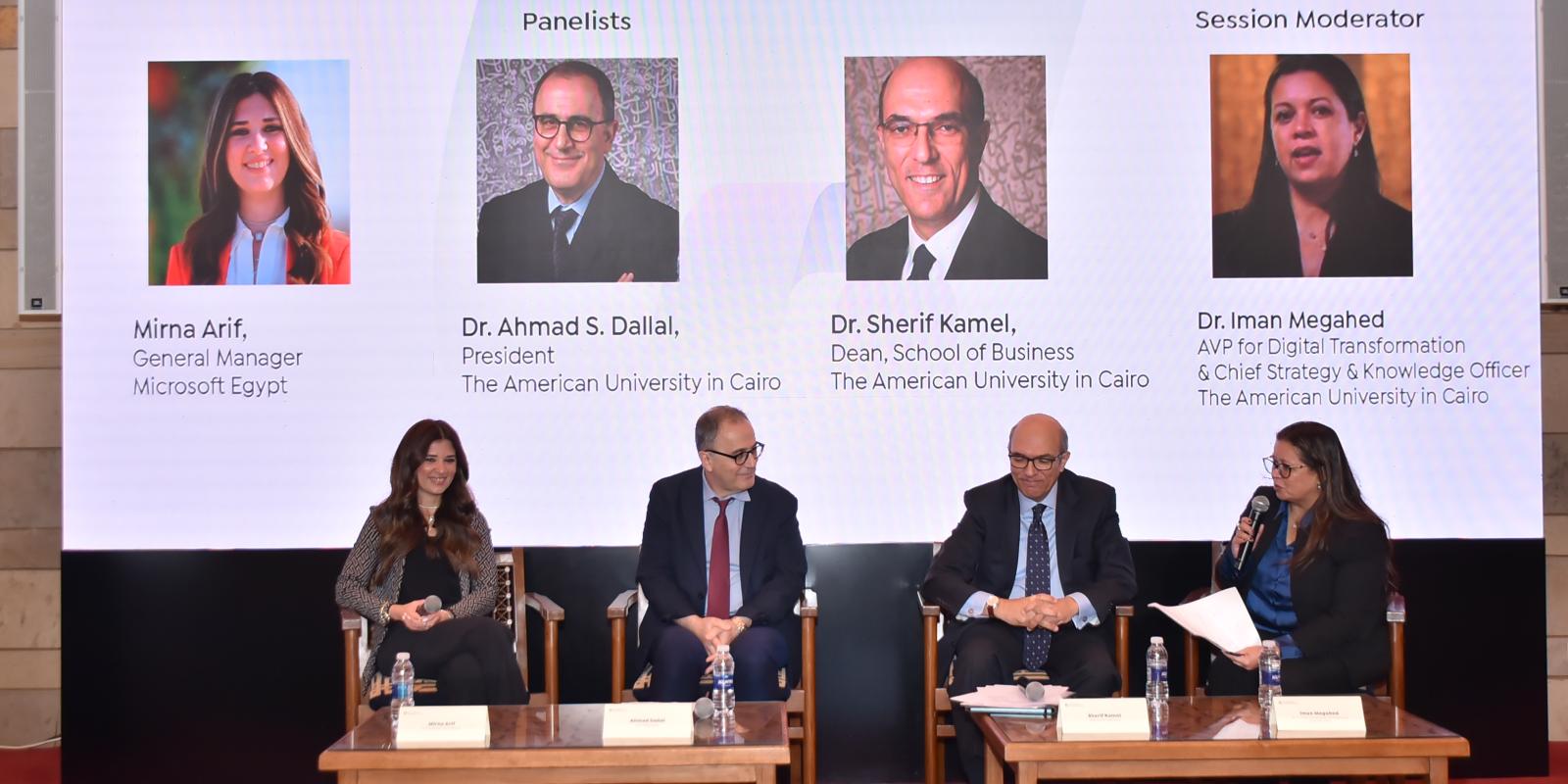
Microsoft: “AI Democratization Will Continue to Expand”
At the forefront of the global conversation on the future of AI in higher ed, AUC engaged in discussions with a Microsoft leadership team on campus about “Shaping the Future with Responsibility.” News@AUC spoke with Amr ElMasry, education lead at Microsoft North Africa, to learn about advancing the future of higher ed with AI.
How can universities and students adopt AI responsibly?
- Instilling a strong understanding of ethical AI principles in their curricula
- Implementing guidelines that ensure fairness, privacy and accountability around AI usage
- Providing access to the right tools, platforms and resources.
- Staying updated on the latest AI advancements and ethical implications
Universities can partner with technology leaders like Microsoft to help foster a responsible AI ecosystem that encourages innovation while also maintaining the highest standards of safety and security.
What trends do you see shaping the future of AI in the next five years?
- Generative AI will revolutionize industries by enabling personalized learning experiences, creative problem-solving tools and advanced content generation.
- AI-powered automation will streamline tasks, allowing educators and students to focus on higher-level thinking and creativity.
- The integration of AI with real-time data analytics will enhance decision making across sectors, supporting adaptive learning systems in education.
- A growing emphasis on responsible AI practices, with regulatory frameworks and standards becoming more robust to ensure ethical and equitable AI adoption globally.
- The rise of Edge AI, where AI systems operate directly on devices such as smartphones and IoT devices, enabling offline applications and reducing latency.
- AI democratization will continue to expand, as providers work with public and private institutions to lower barriers to entry, empowering students, startups and educators to create impactful AI solutions without needing extensive technical expertise.
How do you envision the role of AI evolving in the higher education sector?
- It will enhance personalized learning by offering tools that adapt to individual students’ learning paces and styles, providing tailored resources and feedback. AI-driven platforms will foster collaborative learning and the sharing of knowledge by connecting students and researchers worldwide, breaking down geographical barriers.
- AI will advance academic research by expediting data analysis, leading to breakthroughs in disciplines such as medicine, engineering, social sciences and more.
- As AI becomes more integrated into curricula, universities will play a pivotal role in upskilling students with the technical and ethical expertise required to thrive in AI-driven industries.
We will see [personalized learning] in the form of AI tutors that will encourage learning both inside and outside the classroom. Administrative tasks, such as grading, course scheduling and other workflows, will become increasingly streamlined through automation, enabling educators to dedicate more time to teaching, guidance and mentorship.
It will enhance personalized learning by offering tools that adapt to individual students’ learning paces and styles, providing tailored resources and feedback. What advice would you give to students interested in pursuing a career in AI?
- Focus on building a strong foundation, staying curious and embracing practical experience.
- Take the time to develop proficiency in both mathematics and computer science, and start familiarizing yourselves with programming languages like Python and Java.
- Staying informed about advancements in areas such as generative AI, ethical AI and emerging trends by engaging with research papers, conferences and online courses.
- Gaining hands-on experience through internships and traineeships.
- Interdisciplinary learning, as combining AI knowledge with domains such as business, healthcare or environmental science can unlock innovative applications.
- Cultivating skills in communication, teamwork and critical thinking to collaborate effectively with diverse teams.
With the right skills, mindset and opportunities, students can play a pivotal role in shaping AI’s future responsibly. Platforms like Microsoft Learn offer resources to help students build essential AI and machine learning skills. Another great resource is the Microsoft AI Skills Navigator, a comprehensive platform designed to provide learners with personalized AI education, offering an AI-powered assistant to guide users to the most suitable learning paths based on their goals, roles and skill levels.
